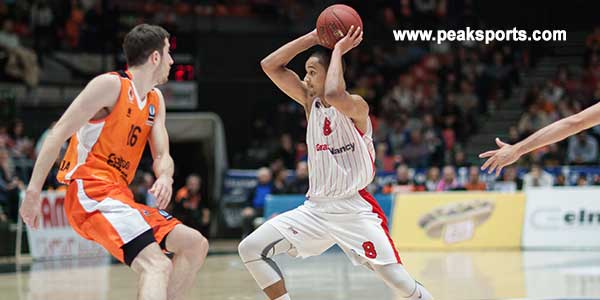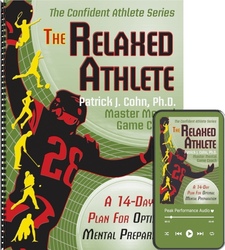
Are you Successful under Pressure?
Each individual athlete responds to pressure in his/her own way.
Kobe Bryant stated he played his best when the pressure was on, “Everything negative – pressure, challenges – are all an opportunity for me to rise.”
Brazilian soccer star Neymar Jr. implied he doesn’t feel pressure, “There is no pressure when you’re making a dream come true.”
Younger athletes hear these types of statements all the time…
“Pressure is your friend,” “Pressure can help you play better” and “Pressure can help you get to the next level.”
Despite hearing about the virtues of pressure, most young athletes view pressure in a negative light.
Many young athletes experience pressure differently, such as, “My parents put too much pressure on me,” “I am under so much pressure with school and athletics,” “I always choke under pressure,” etc.
There are several things at play here:
- Many athletes don’t exactly know what pressure really is. In reality, pressure always exists to some degree in competition. Not only is pressure normal, it is necessary to narrow your focus and fuel your efforts.
- Some young athletes do not know that pressure can be managed. Each athlete performs better within a certain range of pressure. That range of pressure is directly influenced by how you perceive pressure and the specific competitive scenario you are faced with.
- Many athletes have no idea how to cope with pressure. Managing pressure is a skill or what many would call a mental skill. You can learn effective pressure strategies that can help you manage pressure, move you into your optimal range and perform your best.
It is important to understand how you view pressure, how you experience pressure and how you compete under pressure, in order to respond well to pressure.
Performing under pressure was on display at the Final Four match-up between the University of Virginia and Auburn University at the 2019 Men’s basketball NCAA Championship.
Imagine the potential pressure in playing a game that can put you in the National Championship while being televised nationally.
Now, let’s add another level of pressure on top and that is what Virginia guard Kyle Guy experienced in the closing seconds of the game.
Virginia trailed Auburn by two with less than two seconds remaining in the game. Guy received the ball on an in-bound pass and launched a 3-pointer that missed, but he was fouled on the play.
Guy headed to the foul line for three free-throws… Two makes would send the game into overtime and three would win the game.
Guy responded to the pressure by making the first two shots. Then, Auburn called timeout to ice the shooter. With the game on the line, Guy made the third shot to win the game, 63-62, and send Virginia to the Championship final, which they won this week.
Guy talked about how he felt in those final seconds.
GUY: “I can lie to you and say I knew I was going to hit them, but I was terrified.”
Guy was able to manage the pressure by eliminating potential distractions that might have caused excessive nerves. Basically, Guy focused on what he could control which helped him perform under pressure.
GUY: “Yeah, I didn’t want to have anything to do with my teammates or coaches at that time. I just wanted to be in my own space. I knew they had confidence in me; I just needed to build up my own. And we all practiced those shots as a kid. They were probably a little bit more spectacular than free throws, but whatever it takes to win.”
Rising to the occasion requires that “whatever it takes” mentality… And what it takes is learning how to manage pressure.
How to Compete Under Pressure:
First, pressure is what you make of it. The importance of the game, needing to score to win in the last seconds, and teammates depending on you are all triggers for pressure, but it doesn’t mean you have to play these out in your mind and tighten up.
Guy focused on what he’s done in practice all season. He stood up to the line, went quickly into his routine without hesitation, and drained all three shots–even after being “iced” before the final attempt.
He relied on his routine, practice, past come-from-behind wins, and trust in his skill to make the shot.
Footnote: In the Championship game, UVA went 12 for 12 at the free-throw line, which helped them secure the win. Here’s what coach Bennett said after winning the championship game:
“The one thing I said to them before in the locker room, I said, ‘You guys faced pressure that no team in the history of the game has faced, well, really all year. But being down 14 against Gardner-Webb, and you did not panic in that moment, you fought, and found a way out. That, I think, has prepared you for this moment to be able to handle the pressure or the intensity of a national championship game.'”
Related Sports Psychology Articles
- How to Compete Well in Pressure Moments
- How to Perform Big in Pressure Moments
- Is Pressure Your Friend or Foe?
*Subscribe to The Sports Psychology Podcast on iTunes
*Subscribe to The Sports Psychology Podcast on Spotify
Download a free sports psychology report to improve your mental game!
Learn more about our one-on-one mental game coaching.
The Relaxed Athlete

The ability to relax and play your game under pressure is what separates the winner from the loser in any competition. Champion athletes train hard in practice, are motivated for the right reasons, and are able to raise their game in crunch-time with two minutes remaining in the game..
A relaxed and confident performance begins in the mind! When you are mentally prepared to compete, you can have an optimal level of intensity AND poise!
The Relaxed Athlete program is ideal for any athlete that wants to overcome pregame anxiety, worry, or excess tension and learn to perform with poise. It’s also ideal for any coach or parent who wants to teach athletes to perform with poise and relaxation in competition.
